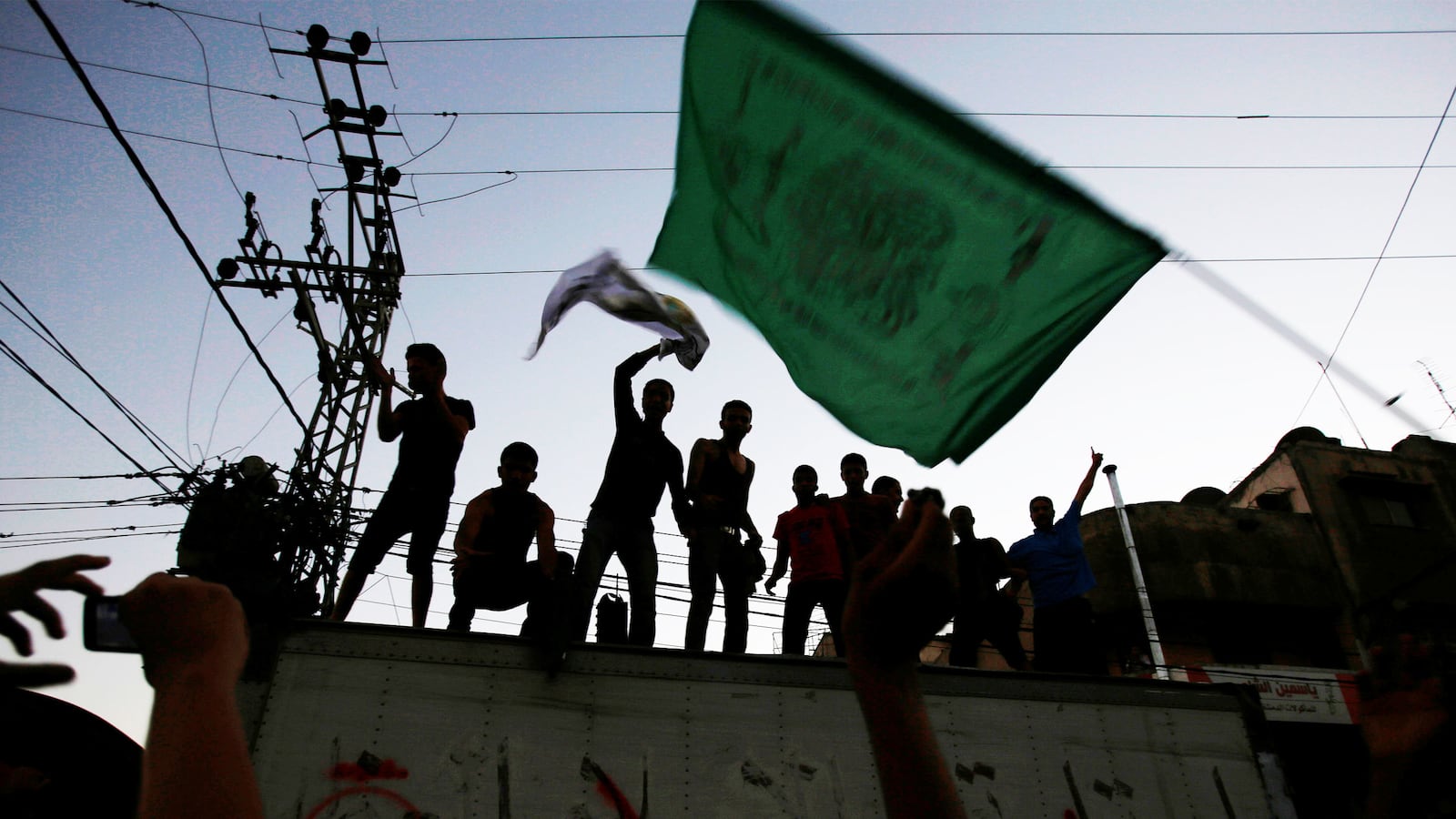BEIRUT, Lebanon — In a bid to redefine itself for today’s political climate in the Middle East, Hamas, has released a new document accepting a Palestinian state along the pre-1967 Green Line. Holding a press conference in the Qatari capital, Doha, outgoing leader Khaled Meshal appeared be thinking of his legacy in an organization that has been isolated across the region. He will be replaced in an internal election later this year.
The move also came as Palestinian Authority President Mahmoud Abbas prepared to meet Wednesday with U.S. President Donald Trump in one of those head-spinning foreign policy turnabouts for which the American administration has grown famous—or infamous.
As candidate, Trump had seemed to have no time for Palestinians, and as president he appointed a settler advocate to be U.S. ambassador to Israel. The U.S. president now seems to have bought into the ritualistic cycle of Washington talks that reaffirm past statements but do little to change the reality on the ground. If Abbas appears optimistic, his core hope may be that Washington continues to fund his government and support his security forces, which coordinate with Israel in the West Bank.
The Hamas statement is significant, but not quite as radical a change as at first it might appear. The official position of the organization, which rules the Israeli-besieged Gaza Strip, has been to demand a Palestinian state stretching from the Jordan River to the Mediterranean Sea, which would mean the effective obliteration of Israel. Now it is saying it will accept a state that is limited to the lands—Gaza, The West Bank and East Jerusalem—that Israel occupied after a six-day war in 1967. That is, Hamas would accept a state in line with what the international community sees as the basis for a “two-state solution.”
Importantly, Hamas also dropped its official connection to Egypt’s Muslim Brotherhood, a move clearly meant to appease the current government in Cairo. And in another ideological shift, the organization whose full name is the Islamic Resistance Movement stated that its fight is political, not religious; it said its enemies are not the Jewish people as a whole, but Israelis.
The new declaration stops short of recognizing Israel– a unilateral move that the late Yasser Arafat, chairman of Palestine Liberation Organization (PLO), made in 1988 to pave the way for what has become almost 30 years of negotiations and a vastly expanded settlement network on the lands where Arafat expected to establish a state.
“Hamas advocates the liberation of all of Palestine, but is ready to support the state on 1967 borders without recognising Israel or ceding any rights,” Meshal told the press conference in Doha.
In many ways, this declaration just codifies what Hamas’s leadership has been saying for years. Back in December 2008, shortly after Barack Obama was elected president of the United States, at a moment when hopes for a new peace initiative were relatively high, Meshal declared in an interview with the Associated Press, “We have offered a truce if Israel withdraws to the 1967 borders, a truce of 10 years as a proof of recognition.”
The irony is that this official shift towards a two-state solution comes at a time when there appears to be little international diplomatic will to push one through, and Palestinians increasingly favor a democratic, bi-national single state—and the de facto end of Israel as a state that privileges its Jewish citizens. The new Hamas policy seems to administer CPR to a process many of its traditional proponents treat as dead.
The government of Prime Minister Benjamin Netanyahu has pursued policies, including expansion of settlements in the occupied territories, that make a two-state solution virtually impossible, but Netanyahu appears to be content to live without a formal peace, and Hamas—branded a terrorist organization by Israel and the United States—has few illusions on that score.
So, rather than a genuine philosophical transformation, the new Hamas declaration should be seen more as an effort to find new allies and contain adversaries in an Arab world still gripped by the unrest and counter-revolutions that followed the Arab Spring.
Hamas first emerged in 1987 alongside the un-armed popular Palestinian uprising of the first Intifada. Inspired by the Muslim Brotherhood in Egypt, it was given breathing space to grow by Israel, which hoped Hamas would divide a Palestinian national struggle that was rooted in the PLO.
However, as the Oslo negotiations and subsequent talks between Israel and the PLO developed in the 1990s, Hamas mounted a wide-scale suicide bombing campaign targeting Israeli civilians in a bid to scuttle a process that allowed the PLO leadership to return from exile but didn’t end to the occupation. When the second Intifada broke out in 2000, Hamas again mounted a suicide bombing campaign against Israelis to set the tone for an armed uprising that Arafat’s Fatah movement tried to match.
In response to widespread international condemnation, the general ineffectiveness of the bloody strategy, and Israel’s ruthless crushing of the second Intifada, Hamas mostly abandoned suicide bombings in 2005. But a year later, in 2006, it became the elected government of the Palestinian Authority (PA). In the fallout from those elections, Israel and the West cut funding to the Palestinain Authority while security forces loyal to Fatah—the largest faction in the PLO—engaged in an expanding, Bush-Administration-encouraged conflict with Hamas that eventually resulted in Hamas seizing power in Gaza while the PA held on to the West Bank.
Strangled by a crippling Israeli blockade that has mostly punished Gaza’s residents since 2007, the movement has fought three devastating wars with Israel in Gaza since 2008 after guerrillas launched rockets into Israel from Gaza territory.
But It is the impact of transformations in the Arab world that best explain the current change in policy. It is telling that Meshal made the announcement from Qatar, where he has been based for several years, after being made unwelcome in countries bordering Israel and the occupied Palestinian territories. There are parallels with Arafat’s own 1988 declaration from Tunis, after the PLO had been forced out of Lebanon.
Following the popular uprisings in Tunisa and Egypt in late 2010 and 2011, Hamas sided with the calls for political freedom and economic justice on Arab streets. When the revolutions spread to Syria, Meshal quit his base in Damascus—effectively severing the organization’s alliance with Bashar al-Assad and Hezbollah, and deeply damaging its relationship with Iran. Instead, he moved to revolutionary Cairo where The Muslim Brotherhood, the movement’s inspirational forefathers, had just won the country’s first democratic election.
Then, in 2013, the Egyptian military lead by now-President Abdel Fattah al-Sisi overthrew the elected government in a bloody coup and Hamas was accused by the Army of conspiring with the Brotherhood as the crackdown spread. The Egyptian army attacked Gaza’s tunnel network and reinforced Israel’s blockade by sealing its own border with Gaza. When Israeli bombs rained down on Gaza in 2014, Egypt left most of those displaced by the onslaught stranded on the border. After Gaza had been reduced to rubble, Egypt, like Israel, blocked most rebuilding materials from entering the strip.
At the same time, Hamas’s affiliates became the main fighting force in Syrian-Palestinian refugee camps, being battered by both the Assad Regime and ISIS. In Lebanon, Hamas now works in a joint security force with Fatah in the Palestinian refugee camps to fight the emergence of ISIS-style jihadist groups amid desperate and only worsening conditions for camp residents.
In Gaza, Hamas is at its most popular when it is seen as fighting Israeli aggression and occupation, and it is at its least popular when perceived as pushing its religious agenda or acting to secure its marginal power. Yet, as another round of Palestinian national reconciliation attempts has seemed to fail and the PA has helped Israel turn out the lights, refusing to pay Israel for Gaza’s electricity, Hamas is again under more pressure.
Dropping its connection to the Muslim Brotherhood and making its position on resolving the Palestinian-Israeli conflict closer to post-coup Egypt’s policy appears to be mostly a call for room to breathe. For an isolated organization pressured on multiple fronts and an outgoing leader looking to preserve it to fight another day, this declaration might be Hamas’s only route to path to survival.






